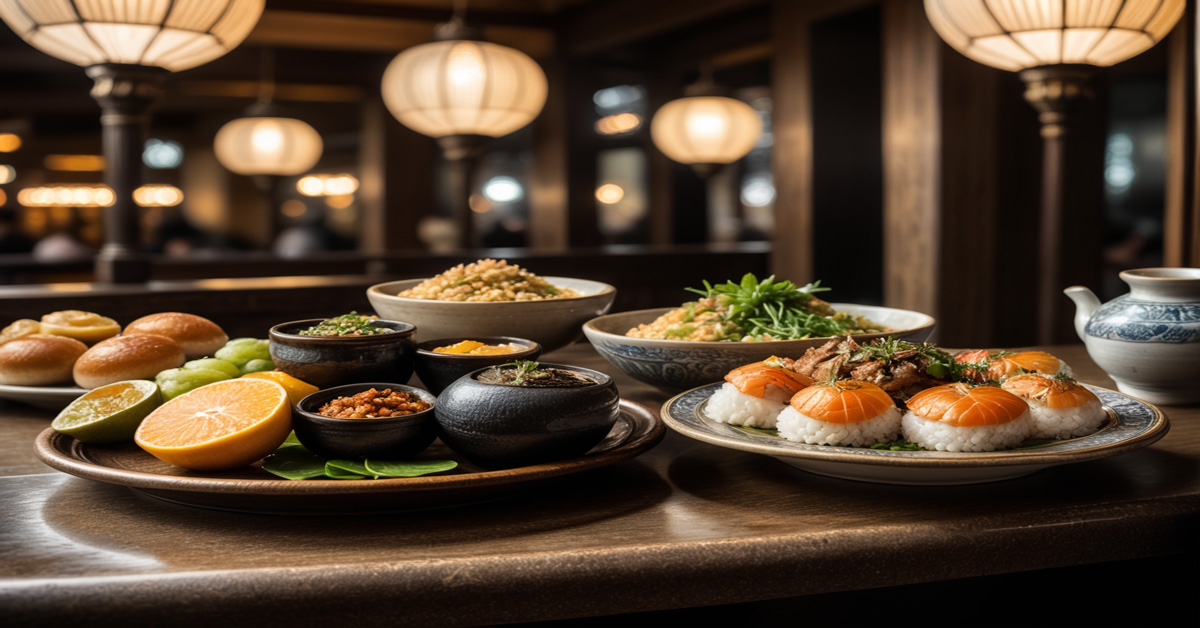Understanding the Importance of Cultural Sensitivity in Travel
Cultural Sensitivity in Travel: A Gateway to Meaningful Experiences
The Significance of Cultural Sensitivity
Cultural sensitivity in travel is not just a buzzword; it’s a fundamental aspect of exploring the world responsibly. When travelers approach a new culture with respect, openness, and a willingness to learn, they pave the way for meaningful interactions and experiences. Understanding and appreciating the customs, traditions, beliefs, and values of the community you are visiting can enrich your journey beyond measure.
Embracing Diversity
One of the core elements of cultural sensitivity is embracing diversity. Every corner of the world is characterized by its uniqueness, shaped by history, geography, and local practices. By acknowledging and celebrating this diversity, travelers can bridge gaps, foster mutual understanding, and forge connections that transcend language barriers. Embracing diversity in all its forms opens up a world of possibilities for authentic cultural exchange.
Respecting Local Customs and Traditions
Respect for local customs and traditions is key to demonstrating cultural sensitivity. From greetings and gestures to dining etiquette and religious practices, every culture has its norms and taboos. Taking the time to familiarize yourself with these aspects before your trip shows a genuine interest in the local way of life. By embracing these customs with an open mind and heart, you show respect for the heritage and identity of the community you are visiting.
Challenges and Opportunities
Navigating cultural differences can present both challenges and opportunities for growth. While misunderstandings may arise due to differing perspectives, these moments also offer valuable insights into alternative ways of thinking and being. Embracing these challenges with an attitude of curiosity and humility can lead to personal transformation and a broader cultural awareness.
Building Cross-Cultural Connections
Cultural sensitivity in travel is a two-way street that involves building cross-cultural connections. Engaging with locals in a spirit of openness and respect can create lasting memories and authentic interactions. By stepping out of your comfort zone and immersing yourself in the daily life of the community, you not only gain a deeper understanding of their culture but also leave a positive impact through meaningful engagement.
Fostering Mutual Respect and Understanding
At its core, cultural sensitivity in travel is about fostering mutual respect and understanding. It’s about recognizing the humanity in each individual, regardless of differences in language, beliefs, or customs. By approaching every interaction with empathy and an open mind, travelers can break down stereotypes, challenge biases, and promote a more inclusive world where diversity is celebrated.
Cultural sensitivity is not just a nicety in travel – it’s a necessity. By embracing diversity, respecting local customs, navigating challenges with grace, building connections, and fostering mutual understanding, travelers can open themselves up to a world of possibilities. So, the next time you embark on a journey, remember that the true essence of travel lies in experiencing different cultures with sensitivity, respect, and an open heart.
Strategies for Enhancing Cross-Cultural Communication
Culture plays a significant role in shaping human interactions and communication. When individuals from different cultural backgrounds come together, effective cross-cultural communication becomes essential to foster understanding and collaboration. Here are some strategies to enhance cross-cultural communication:
Acknowledge and Respect Differences
One of the fundamental steps in improving cross-cultural communication is to acknowledge and respect the cultural differences that exist. Each culture has its norms, values, and communication styles. By showing respect for these differences, individuals can create an environment conducive to effective communication.
Develop Cultural Sensitivity
Cultural sensitivity involves being aware of and understanding cultural differences without assigning a value judgment to them. By developing cultural sensitivity, individuals can avoid misunderstandings and communicate more effectively across cultures. It is essential to approach interactions with an open mind and a willingness to learn from others.
Listen Actively
Active listening is crucial in any communication, especially in cross-cultural interactions. When engaging with individuals from different cultures, it is important to listen attentively, show empathy, and seek clarification when needed. This demonstrates respect for the other person’s perspective and helps avoid misinterpretations.
Adapt Your Communication Style
Flexibility in communication is key to successful cross-cultural interactions. Individuals should be willing to adapt their communication style to accommodate the cultural norms of the other party. This may involve adjusting the tone, pace, or use of gestures to ensure the message is effectively conveyed and understood.
Learn About Other Cultures
To effectively communicate across cultures, it is beneficial to educate oneself about the customs, traditions, and values of different cultures. By increasing one’s knowledge of other cultures, individuals can navigate interactions more smoothly and avoid inadvertent cultural faux pas.
Be Mindful of Nonverbal Cues
Nonverbal communication plays a significant role in cross-cultural interactions. Gestures, facial expressions, and body language can vary widely across cultures and may carry different meanings. Being mindful of nonverbal cues and their cultural interpretations can help prevent misunderstandings and enhance communication effectiveness.
Seek Feedback and Clarification
When communicating across cultures, it is advisable to seek feedback and clarification to ensure mutual understanding. Encouraging open dialogue, asking questions for clarification, and summarizing key points can help confirm that the message has been accurately received.
Cultivate Cultural Intelligence
Cultural intelligence, or the ability to function effectively in culturally diverse settings, is a valuable skill in today’s interconnected world. By cultivating cultural intelligence through exposure to different cultures, self-reflection, and continuous learning, individuals can enhance their cross-cultural communication skills.
Foster an Inclusive Environment
Creating an inclusive environment where all voices are heard and respected is essential for successful cross-cultural communication. By promoting diversity and inclusion in all interactions, individuals can build trust, enhance collaboration, and foster positive relationships across cultures.
Effective cross-cultural communication is a vital skill that enables individuals to bridge cultural divides, build connections, and navigate diverse environments successfully. By implementing strategies such as acknowledging differences, developing cultural sensitivity, active listening, and adapting communication styles, individuals can enhance their cross-cultural communication skills and contribute to a more inclusive and understanding global community.
Navigating Taboos and Etiquette in Different Cultures
Understanding Cultural Sensitivity in Travel
Cultural sensitivity in travel is a critical aspect of exploring new destinations and engaging with people from different backgrounds. Navigating taboos and etiquette in various cultures is essential to ensure respectful and meaningful interactions. By understanding and respecting the customs, traditions, and social norms of different societies, travelers can enhance their experiences and avoid unintentionally causing offense. Let’s delve deeper into the importance of cultural sensitivity and how it can enrich your travel experiences.
Importance of Cultural Sensitivity
Cultural sensitivity involves being aware of, respecting, and valuing the differences in cultures. It requires travelers to approach unfamiliar customs with an open mind and a willingness to learn. By embracing cultural sensitivity, individuals demonstrate respect for the heritage and practices of the communities they visit. This, in turn, fosters goodwill, promotes cultural exchange, and helps break down stereotypes and barriers.
Researching Before You Go
Before embarking on a journey to a new destination, it is essential to conduct thorough research on the cultural norms and practices of the country you plan to visit. Understanding basic etiquette, taboos, and traditions can go a long way in ensuring that you engage with locals in a respectful manner. Researching topics such as appropriate dress codes, greetings, dining etiquette, and gestures can prevent unintentional faux pas and show your hosts that you value their customs.
Adapting to Local Customs
One of the key aspects of cultural sensitivity is the ability to adapt to local customs and traditions. This may involve adjusting your behavior, clothing, or communication style to align with the cultural norms of the host country. By being observant, flexible, and willing to learn, travelers can demonstrate their respect for the local way of life. Whether it’s removing shoes before entering a home, using specific hand gestures, or refraining from certain topics of conversation, adapting to local customs shows a genuine interest in understanding and integrating into the culture.
Respecting Taboos
In many cultures, certain topics, actions, or behaviors are considered taboo or offensive. It is crucial for travelers to familiarize themselves with these taboos to avoid inadvertently causing discomfort or disrespect. Taboos can vary widely between cultures and may include subjects such as religion, politics, personal space, or dietary restrictions. By showing sensitivity to these cultural taboos, travelers demonstrate their awareness and consideration for the beliefs and values of the local population.
Embracing Diversity and Learning Opportunities
Cultural sensitivity in travel provides an opportunity for personal growth, enlightenment, and the chance to broaden one’s perspective. By immersing oneself in new cultures, engaging with local communities, and actively listening to different viewpoints, travelers can gain valuable insights and experiences. Embracing diversity fosters mutual understanding, tolerance, and appreciation for the richness of global cultures.
Understanding cultural sensitivity in travel is essential for fostering meaningful connections, promoting intercultural respect, and enriching travel experiences. By researching, adapting, respecting taboos, and embracing diversity, travelers can navigate unfamiliar cultures with grace and sensitivity. Cultivating cultural awareness not only enhances personal growth but also contributes to building a more interconnected and harmonious global community.
Cultural Sensitivity Training for Travelers
Cultural sensitivity training for travelers is essential in today’s interconnected world where people from diverse backgrounds come together. Understanding and respecting different cultures can enhance travel experiences, promote mutual respect, and avoid unintentional misunderstandings. By delving into cultural sensitivity training, travelers can navigate unfamiliar territories with grace and embrace the richness of global diversity.
Importance of Cultural Sensitivity in Travel
Appreciating the significance of cultural sensitivity in travel is crucial for fostering positive interactions with locals. By acknowledging and respecting the customs, traditions, and beliefs of the host country, travelers can bridge cultural gaps and build meaningful connections. This mutual understanding creates a welcoming environment for both travelers and locals, leading to enriched travel experiences.
Developing Cultural Awareness
Developing cultural awareness is the first step towards becoming a culturally sensitive traveler. It involves learning about the history, social norms, taboos, and practices of the destination country. Through cultural immersion activities, such as trying local cuisine, attending cultural events, or engaging with community members, travelers can deepen their understanding of the local culture and traditions.
Effective Communication Strategies
Effective communication plays a pivotal role in cultural sensitivity during travel. Learning basic phrases in the local language shows respect and willingness to engage with the host culture. Non-verbal communication, such as gestures and body language, also plays a significant role in cross-cultural interactions. Being aware of cultural nuances in communication can prevent misunderstandings and promote positive exchanges.
Respect for Local Customs and Traditions
Respecting local customs and traditions is fundamental in cultural sensitivity training for travelers. This includes dressing modestly, following etiquette guidelines, and observing cultural practices. By demonstrating respect for local traditions, travelers show appreciation for the host culture and contribute to harmonious interactions within the community.
Handling Cultural Differences
Encountering cultural differences is inevitable when traveling to a new destination. Instead of viewing these differences as obstacles, culturally sensitive travelers embrace them as opportunities for learning and growth. By approaching cultural differences with an open mind and curiosity, travelers can broaden their horizons and gain valuable insights into diverse ways of life.
Embracing Diversity and Inclusion
Embracing diversity and inclusion is at the core of cultural sensitivity in travel. By valuing diversity and celebrating cultural differences, travelers can foster a sense of unity and harmony across borders. Embracing inclusivity not only enhances travel experiences but also promotes global understanding and respect.
Cultural sensitivity training for travelers is indispensable in today’s globalized world. By understanding the importance of cultural awareness, effective communication strategies, respect for local customs, and embracing diversity, travelers can embark on transformative journeys that transcend geographical boundaries. Cultivating cultural sensitivity not only enriches travel experiences but also promotes cross-cultural understanding and harmony.
Embracing Diversity: Celebrating Cultural Differences in Travel
Traveling to new destinations opens up opportunities to embrace diversity and celebrate cultural differences. It allows individuals to immerse themselves in unique traditions, languages, and practices beyond their borders. Understanding and respecting these diversities is key to fostering meaningful connections and gaining a deeper appreciation for the world we live in. Let’s explore how cultural sensitivity plays a vital role in enhancing the travel experience.
Importance of Cultural Sensitivity in Travel
Cultural sensitivity in travel is not merely a trend but a fundamental aspect of responsible tourism. It involves being aware of, respecting, and appreciating the customs, norms, and traditions of the places you visit. By approaching new cultures with an open mind and a willingness to learn, travelers can avoid unintentionally causing offense and instead forge genuine connections with locals.
Embracing Differences Through Communication
Communication is at the core of understanding cultural nuances. While language barriers may exist, a simple effort to learn basic phrases or use non-verbal communication can go a long way. Embracing different communication styles and being patient in interactions can bridge gaps and showcase respect for diverse ways of expression.
Respecting Local Traditions and Etiquette
Each destination has its own set of traditions and social norms that shape daily life. It is essential for travelers to familiarize themselves with these practices to ensure they do not inadvertently disrespect local customs. Whether it’s dressing modestly, removing shoes before entering a home, or understanding dining etiquettes, adhering to these guidelines shows respect for the host culture.
Appreciating Cultural Sensitivity in Action
Cultural sensitivity is not limited to understanding differences but also extends to actively participating in cultural experiences. This could involve joining local festivities, trying traditional cuisines, or partaking in rituals or ceremonies. By immersing oneself in these activities, travelers demonstrate a genuine interest in and respect for the culture they are exploring.
Challenging Stereotypes and Preconceptions
Traveling with cultural sensitivity means challenging stereotypes and preconceptions that one may hold about certain cultures. It involves being open to learning from personal experiences rather than relying on generalized beliefs. By approaching each interaction with an open mindset, travelers can break down barriers and foster mutual understanding.
Leaving a Positive Impact Through Responsible Travel
Cultural sensitivity into travel practices not only enriches personal experiences but also contributes to sustainable and responsible tourism. By supporting local businesses, respecting the environment, and engaging with communities in a meaningful way, travelers can leave a positive impact on the places they visit.
Embracing diversity and celebrating cultural differences in travel is a transformative journey that opens doors to new perspectives and meaningful connections. By prioritizing cultural sensitivity, travelers can not only enrich their own experiences but also contribute to a more interconnected and empathetic global community.
Conclusion
As global citizens, understanding and respecting cultural differences is vital for creating meaningful connections and enhancing the overall travel experience. By recognizing the importance of cultural sensitivity in travel, individuals can bridge gaps, foster mutual respect, and cultivate enriching cross-cultural interactions.
To enhance cross-cultural communication, travelers can adopt various strategies to navigate linguistic and cultural barriers effectively. These include learning basic phrases in the local language, using non-verbal cues thoughtfully, and being open to different communication styles. By showing a genuine interest in the local culture and customs, travelers can form deeper connections with people from diverse backgrounds.
Navigating taboos and etiquette in different cultures requires a blend of research, sensitivity, and adaptability. Being aware of cultural norms regarding gestures, dress codes, and social protocols can prevent misunderstandings and demonstrate respect for local traditions. Additionally, travelers can seek guidance from locals or tour guides to navigate specific customs and traditions respectfully.
Cultural sensitivity training equips travelers with the knowledge and skills needed to engage with diverse cultures respectfully. Such training often covers topics like cultural awareness, effective communication strategies, and conflict resolution techniques. By participating in cultural sensitivity programs, travelers can enhance their intercultural competence and contribute positively to the communities they visit.
Embracing diversity is not merely about tolerating differences but celebrating the richness of various cultures encountered during travel. By immersing oneself in local festivals, arts, cuisine, and traditions, travelers can gain a deeper appreciation for the unique heritage of each destination. Embracing diversity fosters a spirit of inclusivity, broadens perspectives, and promotes mutual understanding among people of different backgrounds.
Cultural sensitivity is the cornerstone of meaningful and respectful travel experiences. By understanding the significance of cultural awareness, implementing effective communication strategies, navigating taboos with care, engaging in cultural sensitivity training, and celebrating diversity, travelers can forge genuine connections and create lasting memories across borders. Embracing cultural differences not only enriches individual journeys but also contributes to a more interconnected and harmonious global community. Remember, the true essence of travel lies in the willingness to learn, adapt, and embrace the myriad cultures that make our world a vibrant tapestry of traditions, stories, and experiences. Let us embark on our travels with open hearts, open minds, and a profound respect for the diversity that surrounds us.




